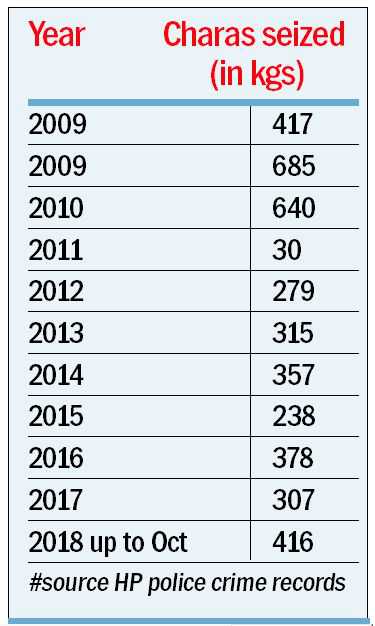
Ravinder Makhaik
Faced with a surge to remove medicinal marijuana from the list of banned drugs and permit cannabis cultivation has the Himachal Government in a catch-22 situation. After all, some of the world’s finest hash strains are grown in the state and the government is pushing back hard to contain the illegal trade in it.
Spearheading the demand for a policy to permit cannabis cultivation is Maheshwar Singh, the scion of Kullu royal family.
“Views about medicinal uses of marijuana are changing globally,” he says, adding: “It’s about time India, too, revisits the law.”
“Before it was banned in Kullu-Manali valley, growing cannabis was a cottage industry, as its strong fibre was used to make pula’s, (hemp shoes), ropes and bags. The seed formed part of a staple diet. I had first raised the matter in the Lok Sabha,” he said.
Kullu MLA Sunder Singh Thakur went public on with the matter recently. At a conference, the legislator said: “A policy change about legal cannabis cultivation for therapeutic purposes will boost tourism and turn the state into a wellness hub.”
Rising incidents of drug abuse, particularly among the youth, has got Chief Minister Jai Ram Thakur to take a tough stand against the problem. He has asked the police to clip the supply lines and book peddlers. The police till October, seized 416-kg contraband (charas), which is 36 per cent more than what was caught in 2017.
As the drive is beginning to yield results, advocates for the policy change about cannabis cultivation for medicinal and industrial usages have forced the CM to retract on the issue. “We are legally examining the matter about permitting cannabis cultivation,” he said.
With claims about cannabis oil having medicinal and therapeutic properties, the World Health Organisation in its pre-review (November 2017) report held Cannabidiol (CBD), a naturally occurring cannabinoid found in cannabis plants, to have demonstrated as an effective treatment for epilepsy in several clinical trials.
The WHO also held that there was preliminary evidence that CBD may have useful treatment for a number of other medical conditions. It also mentions that there were several unsanctioned CBD medical products with oils, supplements, gums and high concentration extracts available online for the treatment of many ailments.
Countries like Germany, Canada, Israel and many states in the US have even modified their narcotics control laws to accommodate CBD as a medicinal product.
However, it is the larger proportion of tetrahydrocanabinol (THC) in comparison to CBD found in some cannabis plant strains that is the problem, as it can have a psychoactive reaction in the brain.
It was in pursuance of the US-backed 1961 treaty for Single Convention on Narcotics, that India banned cannabis cultivation in 1985.
“It was signed under pressure by India because cannabis products are very much a part of the country’s culture and the ayurvedic treatment. However, the drug abuse aspect of it needs to be kept in check,” says Maheshwar Singh.
Uttarakhand has become the first state in the country to launch a cannabis cultivation pilot project. In July last year, the Indian Industrial Hemp Association, a non-profit organisation, was allowed to commercially cultivate cannabis on 1,000 hectares of Pauri-Garhwal region for its hemp fibre crop.
Sensing a business opportunity when contraband laws are being challenged, several start-ups like the Mumbai-based Bombay Hemp Co, Bengaluru-based Namrata Hemp Co are waiting in the wings to start legal cultivation of cannabis.
Popular in international market
Despite the best of efforts to contain the illegal trade, some hash (charas) from the exotic valleys of Kullu-Manali finds its way into the international market. A list of prize-winning hash in the coffee shops of Amsterdam has Manali Cream, Kali Mist, Malana Cream, Warlock, Sunburst, Shanti Baba and Baba’s Holy Balls on their menus. All these brands are said to be sourced from Himachal.
With 1-gram of this hash priced between 13 to 18 Euros, mere 1-kg of the high grade hash is worth Rs 10 to 14 lakh in the European market. Just the 4,062-kg charas seized in the last 10 years would be more than Rs 400 to 570 crore in the international market.
With the crop being a goldmine, especially for its drug properties and the cannabis plant found growing abundantly in the wild, besides being illegally cultivated in some of the poorest parts of the state, the government is caught up in a bind whether to permit its cultivation and generate much needed farm employment or enforce the ban more strictly and contain the illegal drug trade.



























